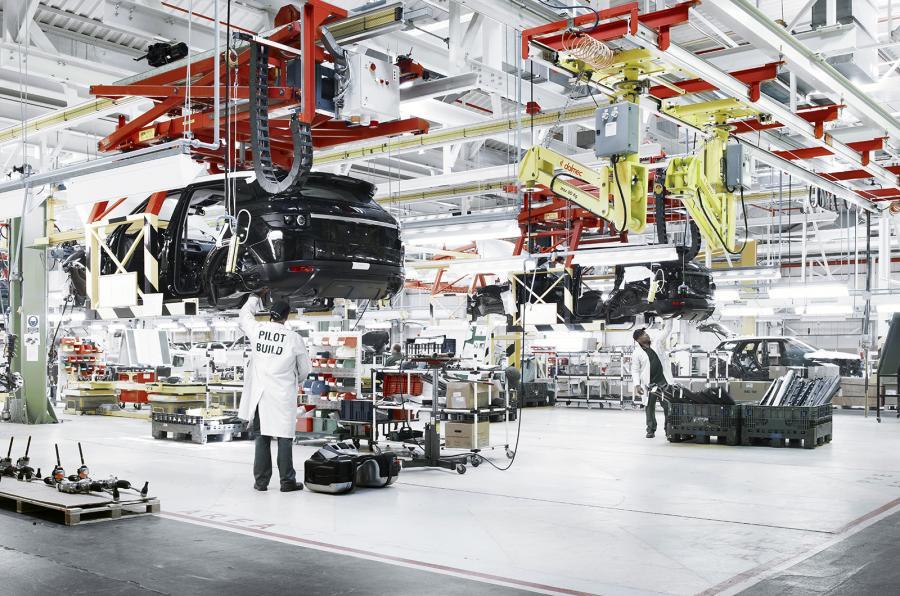Jaguar Land Rover's Solihull factory has begun a planned two week shutdown, following a significant decline in global sales in September.
The company had already begun adjusting the output of its factories in response to market demand, with 2000 workers at the Castle Bromwich factory responsible for the Jaguar XE, Jaguar XF and Jaguar XJ saloons moving to a three-day working week until after the Christmas period. The Solihull plant shutdown will last for two weeks until the 5th of November, with no jobs affected by the closure and customer cars would still be delivered on time.
“As part of the company’s continued strategy for profitable growth, Jaguar Land Rover is focused on achieving operational efficiencies and will align supply to reflect fluctuating demand globally as required,” a JLR spokesperson said. “The decision to introduce a two-week shutdown period later this month at Solihull is one example of actions we are taking to achieve this.
“Customer orders in the system will not be impacted and employees affected will be paid for the duration of the shutdown.”
Worldwide sales of 57,114 cars in September was a 12.3% decrease compared with the same month last year, despite what JLR calls “strong” demand for new luxury models such as the Range Rover Velar and the electric Jaguar I-Pace.
The Chinese market suffered the biggest decline, at a significant 46.2% - a slip the company blames on changes in import duty and continued trade tensions holding back consumer demand. European numbers also decreased by 4.7%.
JLR’s UK sales fell by just 0.8% in September, bucking the industry-wide decline of 20.5%. Several factors can be attributed to the slump, including shrinking demand for diesel models, reduced interest in saloon cars and ongoing Brexit uncertainty.
Unite, the UK’s biggest union for car workers, said a “triple whammy” of Brexit uncertainty, government confusion over diesel and ministers’ half-hearted support for electric vehicles was threatening the future of the UK car industry.
“Government ministers’ trashing of diesel, despite the UK making some of the cleanest engines in the world, combined with their shambolic handling of Brexit, is damaging the UK car industry and the supply chain,” Unite national officer Des Quinn said. “Over the past decade, Jaguar Land Rover workers have worked tirelessly to turn the car maker’s fortunes around. Ministers now risk turning them and their colleagues in the supply chain from hero to zero.”





Join the debate
Add your comment
Engines
LR desperately need decent 3 lt V6 petrol engines for their range.....the 2lt's 4cylinders currently offered just can't hack it despite their high bhp output.
Surely the only market brexit
It can't be blamed for Europe and China having poor sales.
What can be blamed is:
a) An excessive reliance on tepid 4 cylinder engines in almost everything. Not acceptable in £30k plus vehicles.
b) Terrible LR designs post current Range Rover and Evoque. Despite his obnoxious pomposity, Gerry McGovern has had complete creative seizure for the last 5 years. Discovery 5 is disgraceful.
c) LR has sold its soul to a fickle urban lifestyle market and is now paying the price.
d) LRs sense of shame that they ever built the original Land Rover.
Speaking as if everything would be fine if it wasn't for brexit is a dangerous delusion, however unwelcome it may seem to them. I am in the industry and have yet to hear anyone say they are not going to buy a vehicle until they have brexit certainly.
..hear, hear ...£80k cars
..hear, hear ...£80k cars with a punny 2lt 4cly!
[quote=GZ]
[quote=GZ]
..hear, hear ...£80k cars with a punny 2lt 4cly!
JLR are the architects of
JLR are the architects of their own misfortune. Everyone knows this, but you still get the intelligence-bereft comments on here blubbering...it's all Brexit's fault! JLR have invested wrongly, chased a chinese market that's bit them, and failed (bizarrely) to see the death of diesel (when everyone else spotted it coming). The worrying thing for them (according to analysts at Moody's) is that they need to invest massively in new models. So far from JLR being able to bounce back, I doubt they'll still be around in 20 years from now. As I said, it's all their own fault, and I've been pointing it out for years.